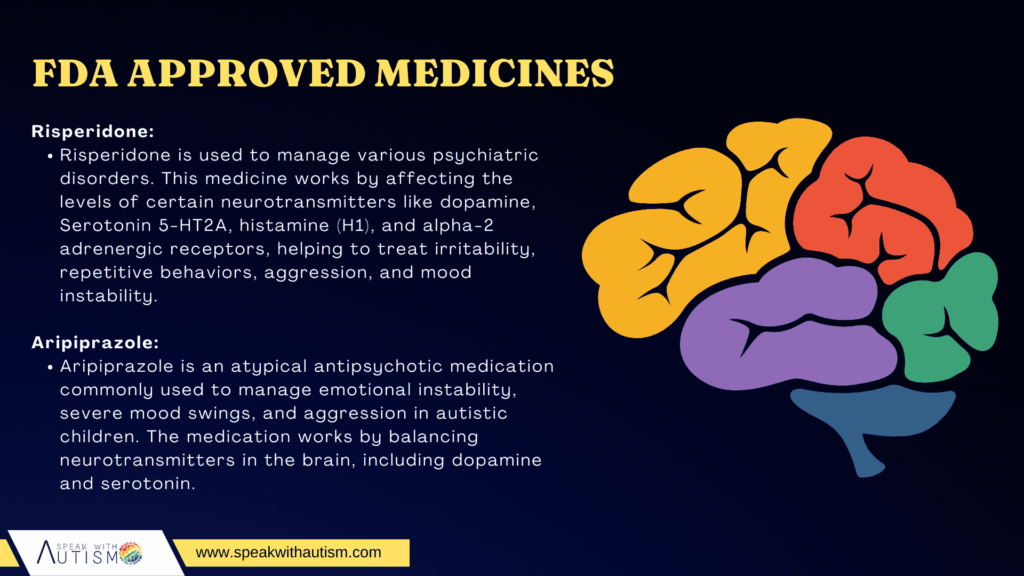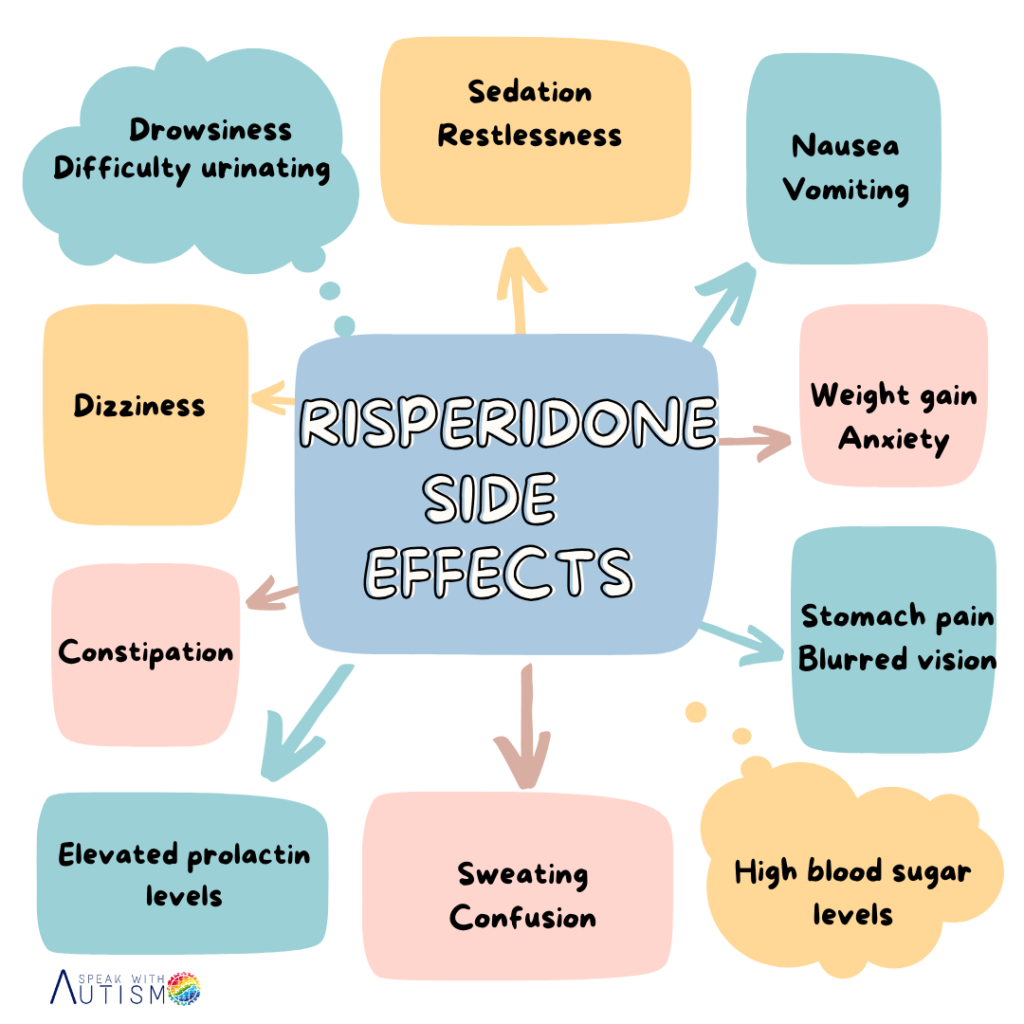Labeled Medication Treatments for autism are often used to target specific behaviors and symptoms associated with the condition. Autistic individuals often face challenges such as gastrointestinal issues, sleep disturbances, aggression, irritability, and difficulties with focus and attention.
Table of Contents
Neurologists typically prescribe Risperidone and Aripiprazole for severe irritability and aggression. However, when parents report specific issues like anxiety, hyperactivity, or sleep disturbances, neurologists often incorporate Off-Label Medicines to address these behaviors effectively.
These medications work by targeting neurotransmitters and brain chemicals, helping to regulate mood, reduce aggression, and improve focus and attention. Below is a detailed overview of labeled medications, including their benefits, side effects, behaviors addressed, and mechanisms of action. Autism treatment is broadly divided into two categories: Labeled Medicines and Off-Label Medicines.
FDA-approved or Labeled Medicines for Autism
Labeled Medicines are FDA-approved drugs Risperidone and Aripiprazole specifically prescribed to address core autism-related symptoms, such as severe irritability and repetitive behaviors.
Off-Label Medicines
Off-label medicines are used to target associated behaviors and conditions, such as aggression, sleep disturbances, hyperactivity, and anxiety, even though they are not officially approved for autism. Examples of off-label medicines are Imodium, Clonidine, Adderall, Melatonin, and Selective Serotonin Reuptake Inhibitors (SSRIs). For off-label medicines, you can read blog 2.0 that is: Off-Labeled Medication Treatment for Autism: Reliefs, Side Effects and Mechanism of Action.

Labeled Medicines or FDA approved Medication Treatments for Autism
1. Risperidone (Risperdal)
Risperidone is used to manage various psychiatric disorders. This medicine works by affecting the levels of certain neurotransmitters like dopamine, Serotonin 5-HT2A, histamine (H1), and alpha-2 adrenergic receptors, helping to treat irritability, repetitive behaviors, aggression, and mood instability.
Behavior Addressed:
This medicine helps in managing severe irritability, aggression, tantrums, repetitive behaviors, self-harm and emotional outbursts.
Mechanism of Action:
Dopamine D2 Receptors
Action: block these receptors.
Effect: reduces irritability, aggression, and repetitive behaviors.
Serotonin 5-HT2A Receptors
Action: blocks serotonin activity.
Effects: Improves mood and reduces anxiety.
Alpha-2 Adrenergic Receptors
Action: slightly blocks these receptors.
Effects: providing a calming effect.
Histamine H1 Receptors
Action: blocks histamine receptors.
Effects: causes mild sedation, helping with sleep and hyperactivity.
Benefits:
Aggression and mood swings are reduced. Control of emotions and social behaviors has improved.
Side Effects:

- Weight gain, hormonal imbalance (prolactin levels), sedation, dizziness and fatigue.
- Movement disorders may occur in rare cases.
2. Aripiprazole (Abilify)
Aripiprazole is an atypical antipsychotic medication commonly used to manage emotional instability, severe mood swings, and aggression in autistic children. The medication works by balancing neurotransmitters in the brain, including dopamine and serotonin.
Behaviours addressed:
Emotional instability, severe mood swings and aggression. It also controls hyperactivity and self-harm behaviour.
Mechanism of action:
D2 receptor
Acts as a partial agonist on dopamine (D2 receptor). This means it regulates the effects of dopamine – if dopamine levels are high it reduces them, and if they are low it tries to increase them.
Serotonin receptors
It acts as an agonist on serotonin receptors, which help regulate mood and behavior. It also helps improve the serotonin imbalance often seen in autism spectrum disorder (ASD).
Benefits:
- By regulating dopamine, aripiprazole helps reduce aggression, irritability, and hyperactivity.
- By regulating serotonin, it improves social behaviour and mood, and may also help reduce repetitive behaviours.
Side effects:
Drowsiness or fainting
Weight gain
Dizziness (vertigo)
Headache (headache)
Akathisia (restlessness)
Serious side effects:
Tardive dyskinesia: This is a rare and serious condition that may involve uncontrolled movements such as lip smacking, tongue movement, or hand shaking.
Increased risk of suicide: Some patients may have mood swings or thoughts of suicide
Low blood pressure (hypotension)
Neuroleptic malignant syndrome (NMS): This is a life-threatening condition that can cause high fever, muscle stiffness, and confusion.
Serious allergic reaction: Rash, swelling, and breathing problems may occur, which may be a sign of an allergic reaction.
Conclusion: Medication Treatments for Autism
Medication is a helpful option for autism, but it is not safe to take these medicines without consultation. These medications should only be taken under medical supervision so that the doctor can make necessary adjustments over time. If you want to change the medications based on your child’s behavior, this can be done with the doctor’s guidance.
These medications also have some side effects, so they should only be used under the supervision of a doctor. An individualized plan is necessary for every child to maintain a balance between medications and therapies. Along with medications, doctors also recommend therapies such as speech therapy, sensory integration therapy, occupational therapy, behavior therapy, and others. By using additional autism treatments and therapies, the balance of medications and therapies can help support the child’s life skills.
Frequently Asked Questions (FAQs)
What are the calming medicines for autism?
Medications that have a calming effect on autism are usually useful for children who are overly excited or stressed, irritable, and self-harm-causing. These medications help calm down children and control their behavior. Some common are:
Risperidone
Aripiprazole
Benzodiazepines
Mood stabilizers
Melatonin
What are the serious side effects of Risperidone?
Risperidone can have some serious side effects that parents need to pay attention to. These side effects are:
Severe allergic reactions
Neuroleptic malignant syndrome (NMS)
Tardive dyskinesia
Metabolic changes
Drowsiness
Cardiovascular problems
What are the serious side effects of Aripiprazole?
Aripiprazole can have some serious side effects that parents need to pay attention to. These side effects are:
Tardive dyskinesia
Increased risk of suicide
Low blood pressure
Neuroleptic malignant syndrome (NMS)
Serious allergic reaction
How Risperidone Acts in autistic children?
Risperidone is used to manage various psychiatric disorders. This medicine works by affecting the levels of certain neurotransmitters like dopamine, Serotonin 5-HT2A, histamine (H1), and alpha-2 adrenergic receptors, helping to treat irritability, repetitive behaviors, aggression, and mood instability.
How does Aripiprazole Act in autistic children?
Aripiprazole is an atypical antipsychotic medication commonly used to manage emotional instability, severe mood swings, and aggression in autistic children. It helps to control hyperactivity and self-harm behaviors. The medication works by balancing neurotransmitters in the brain, including dopamine and serotonin.

Pingback: Does Adderall Help Autism? Discover its Facts